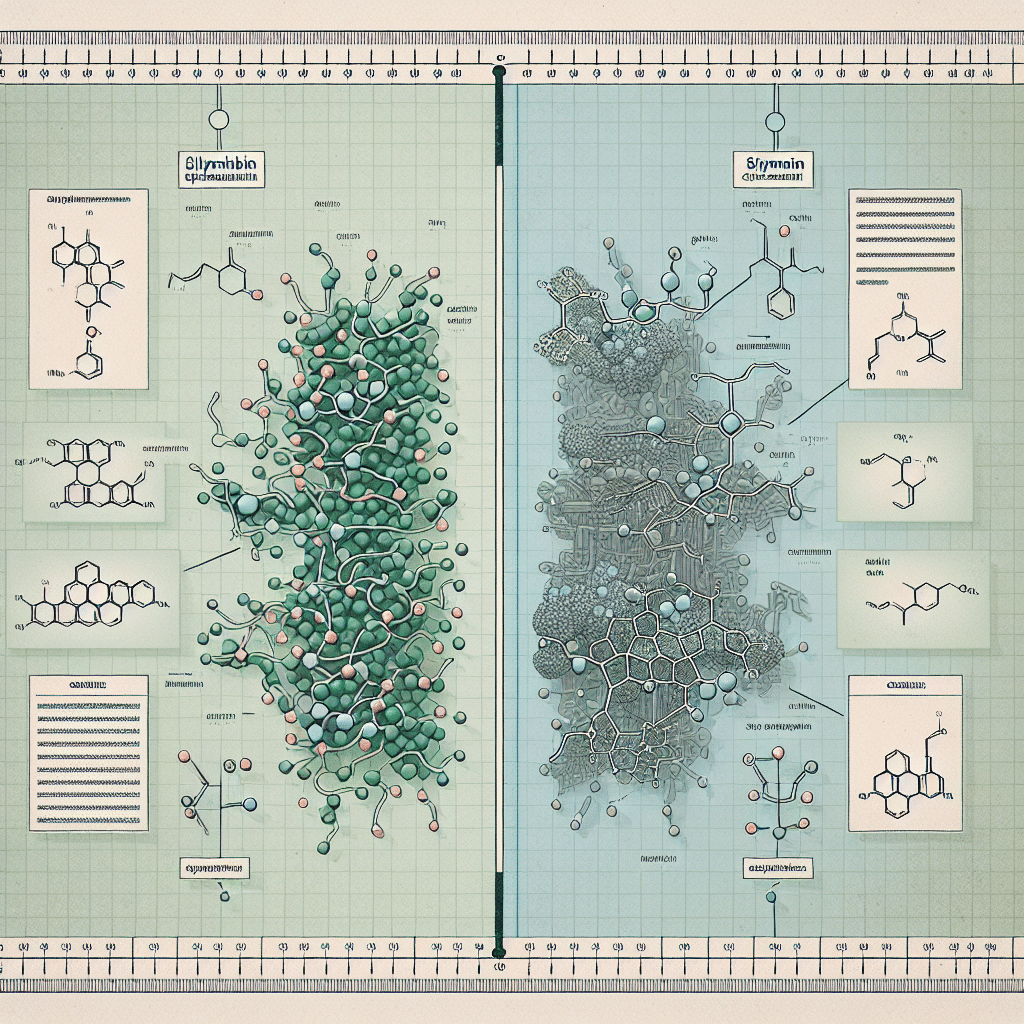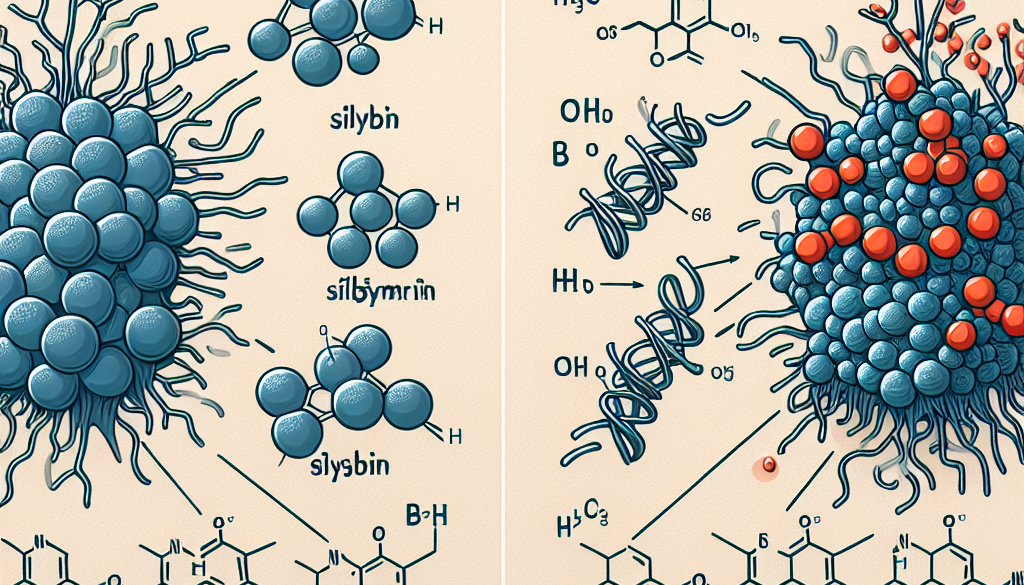Silybin Phytosome vs Silymarin: Comparison
-
Table of Contents
- Silybin Phytosome vs Silymarin: In-Depth Comparison and Analysis
- Understanding Silymarin and Its Components
- Introduction to Silybin Phytosome
- Comparing Bioavailability: Silybin Phytosome vs Silymarin
- Efficacy in Liver Health and Protection
- Other Potential Health Benefits
- Case Studies and Research
- Choosing Between Silybin Phytosome and Silymarin
- Conclusion: Key Takeaways
- Discover ETchem’s Protein Products
Silybin Phytosome vs Silymarin: In-Depth Comparison and Analysis

Milk thistle, a plant with a long history of use in traditional medicine, is primarily known for its liver-protecting effects. The active compounds derived from this plant, silybin and silymarin, have been extensively studied for their potential health benefits. In recent years, advancements in supplement technology have led to the development of silybin phytosome, a more bioavailable form of silybin. This article delves into the differences between silybin phytosome and silymarin, examining their efficacy, bioavailability, and potential health benefits.
Understanding Silymarin and Its Components
Silymarin is a complex of flavonolignans extracted from the seeds of the milk thistle plant (Silybum marianum). It consists of several compounds, including silybin (also known as silibinin), isosilybin, silychristin, and silydianin, with silybin being the most active and abundant component. Silymarin has been traditionally used to support liver health, protect against toxins, and promote the regeneration of liver cells.
Introduction to Silybin Phytosome
Silybin phytosome is a patented form of silybin that is bound to phosphatidylcholine, a key component of cell membranes. This combination creates a complex that is more readily absorbed by the body compared to standard silybin or silymarin extracts. The enhanced bioavailability of silybin phytosome means that it can potentially offer greater therapeutic benefits at lower doses.
Comparing Bioavailability: Silybin Phytosome vs Silymarin
One of the primary differences between silybin phytosome and silymarin is their bioavailability. Bioavailability refers to the extent and rate at which the active moiety of a drug or supplement is absorbed and becomes available at the site of action.
- Silymarin: Traditional silymarin extracts have limited bioavailability due to poor water solubility and rapid metabolism in the liver. This means that a significant portion of silymarin taken orally is not effectively absorbed into the bloodstream.
- Silybin Phytosome: The phytosome technology used in silybin phytosome enhances the compound’s solubility and absorption. Studies have shown that silybin phytosome has significantly higher bioavailability compared to standard silymarin, which may translate to improved clinical outcomes.
Efficacy in Liver Health and Protection
Both silybin phytosome and silymarin have been researched for their hepatoprotective properties. Here’s how they compare in terms of efficacy:
- Silymarin: Numerous studies have demonstrated that silymarin can help protect the liver from toxins, promote liver cell regeneration, and have anti-inflammatory and antioxidant effects. However, its low bioavailability can limit its effectiveness.
- Silybin Phytosome: Due to its enhanced absorption, silybin phytosome may offer more potent liver protection and a better therapeutic profile. Clinical trials have indicated that silybin phytosome can significantly improve liver function markers in patients with liver diseases when compared to standard silymarin.
Other Potential Health Benefits
Aside from liver health, both silybin phytosome and silymarin have been studied for other potential health benefits:
- Antioxidant Activity: Both compounds exhibit strong antioxidant properties, which can help combat oxidative stress and may reduce the risk of chronic diseases.
- Anti-inflammatory Effects: They may also help reduce inflammation, which is a key factor in many health conditions.
- Anti-Cancer Potential: Some research suggests that silybin and silymarin could have anti-cancer effects by inhibiting tumor cell proliferation and inducing apoptosis.
Case Studies and Research
To further illustrate the differences between silybin phytosome and silymarin, let’s look at some specific case studies and research findings:
- A study published in the “European Journal of Drug Metabolism and Pharmacokinetics” found that silybin phytosome had a significantly higher bioavailability than silymarin, with a more pronounced effect on improving liver enzymes in patients with liver disease.
- Another study in the “Journal of Clinical Pharmacology” reported that patients taking silybin phytosome experienced better clinical outcomes and liver function improvements compared to those taking standard silymarin.
Choosing Between Silybin Phytosome and Silymarin
When deciding between silybin phytosome and silymarin, consider the following factors:
- Purpose of Use: If you are looking for maximum liver protection and support, silybin phytosome may be the better choice due to its higher bioavailability.
- Dosage and Formulation: Silybin phytosome supplements may require lower doses to achieve the same effect as higher doses of silymarin.
- Cost: Silybin phytosome supplements may be more expensive due to the patented technology and production process.
Conclusion: Key Takeaways
In conclusion, both silybin phytosome and silymarin offer valuable health benefits, particularly in supporting liver health. The main advantage of silybin phytosome lies in its enhanced bioavailability, which can lead to greater efficacy at lower doses. When choosing a supplement, it’s important to consider your specific health goals, budget, and the scientific evidence supporting each option.
Discover ETchem’s Protein Products
If you’re interested in high-quality protein supplements, consider exploring ETchem’s range of protein products. ETchem is a reputable manufacturer and supplier known for their premium collagens and protein supplements. Their products cater to various industries, including nutraceuticals, pharmaceuticals, and food and beverage, providing comprehensive solutions for your protein needs.
About ETChem:
ETChem, a reputable Chinese Collagen factory manufacturer and supplier, is renowned for producing, stocking, exporting, and delivering the highest quality collagens. They include marine collagen, fish collagen, bovine collagen, chicken collagen, type I collagen, type II collagen and type III collagen etc. Their offerings, characterized by a neutral taste, instant solubility attributes, cater to a diverse range of industries. They serve nutraceutical, pharmaceutical, cosmeceutical, veterinary, as well as food and beverage finished product distributors, traders, and manufacturers across Europe, USA, Canada, Australia, Thailand, Japan, Korea, Brazil, and Chile, among others.
ETChem specialization includes exporting and delivering tailor-made collagen powder and finished collagen nutritional supplements. Their extensive product range covers sectors like Food and Beverage, Sports Nutrition, Weight Management, Dietary Supplements, Health and Wellness Products, ensuring comprehensive solutions to meet all your protein needs.
As a trusted company by leading global food and beverage brands and Fortune 500 companies, ETChem reinforces China’s reputation in the global arena. For more information or to sample their products, please contact them and email karen(at)et-chem.com today.




